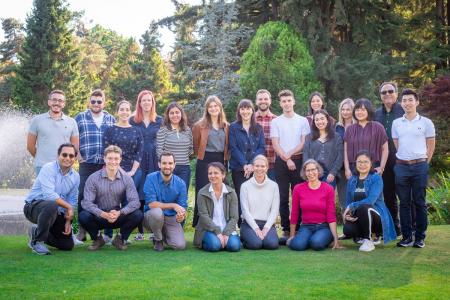Vision
 A world where people benefit from the power of the immune system to prevent and treat transplant rejection and autoimmune disease.
A world where people benefit from the power of the immune system to prevent and treat transplant rejection and autoimmune disease.
Mission
We need better treatment options for diseases caused by overactive immune responses. Inspired by natural biological processes and motivated by people in need, we develop new therapies that harness the immunomodulatory properties of regulatory T cells. We take a collaborative approach and create a stimulating and supportive training environment that spans career stages. We are a passionate, curious and diverse group of scientists having fun doing something meaningful.
Levings Lab Research Overview
Our immune system is actively regulated so that, while it is fighting off foreign/dangerous substances, it does not react to our own cells or harmless materials. This balancing act of attack vs ignore is called immune tolerance. Lack of immune tolerance causes many chronic conditions, such as autoimmune disease and transplant rejection. At present, the only treatment is life-long treatment with immunosuppressive drugs that suppress all immune responses and put patients at risk for infection and even cancer – often without controlling the underlying disease. It is crucial to find new therapies to mitigate the need for non-specific immunosuppression.
 My research focuses on immune cells called T regulatory cells (Tregs) that are central to immune tolerance and that are a very promising new therapeutic tool. To exploit the natural capacity of Tregs to induce immune tolerance, and to design effective therapies to restore immune tolerance in patients with immune-mediated disease, we need to define how, when and where Tregs function in the body.
My research focuses on immune cells called T regulatory cells (Tregs) that are central to immune tolerance and that are a very promising new therapeutic tool. To exploit the natural capacity of Tregs to induce immune tolerance, and to design effective therapies to restore immune tolerance in patients with immune-mediated disease, we need to define how, when and where Tregs function in the body.
My research program has 3 major themes that aim to (i) build on our recent discoveries to understand Treg biology and (ii) apply that knowledge to develop and assess treatments designed to manipulate immune tolerance. My work integrates lab and clinical studies, applies advanced methods in the context of transplant rejection and autoimmunity, and creates outputs with broad relevance for chronic immune-mediated diseases.
Theme 1: Understanding the molecular and cellular biology of Tregs. We are working on defining the unique mechanisms that control Treg function. The aim of this work is to discover new therapeutic targets and understand how Tregs can be manipulated to optimize their effectiveness as a cell-based therapy.
 Theme 2: To conduct first-in-man clinical trials of Treg therapy in transplantation. We have developed two approaches to generate therapeutic Tregs. As part of national networks, and with industry support, we now aim to test these approaches as a method to reduce rejection in humans undergoing transplantation of hematopoietic stem cells or a solid organ.
Theme 2: To conduct first-in-man clinical trials of Treg therapy in transplantation. We have developed two approaches to generate therapeutic Tregs. As part of national networks, and with industry support, we now aim to test these approaches as a method to reduce rejection in humans undergoing transplantation of hematopoietic stem cells or a solid organ.
Theme 3: Clinical implementation of standardized immune monitoring. Assessing the effectiveness of immune therapies requires the transfer of methods and assays from research labs to clinical immunology labs. We are implementing this approach across Canada and developing platforms using standardized methodology to measure immunity in patient cohorts and clinical trials.
Specific projects currently on-going include:
- Engineering Tregs to tailor their antigen specificity and function
- Developing methods to use Tregs as a cellular therapy in transplantation
- Studying unique cell-signaling pathways in human and mouse Tregs
- Developing biomakers to track Treg function
- Studying the interaction between Tregs and IL-17-producing cells
- Studying tissue-derived Tregs in health versus disease
Partnerships
The Levings Lab works closely with research groups and partners, such as:
- University of British Columbia
- The Canucks for Kids Fund Childhood Diabetes Laboratories at BC Children's Hospital
- Canadian National Transplantation Research Program
- Follow @CNRTP on Twitter